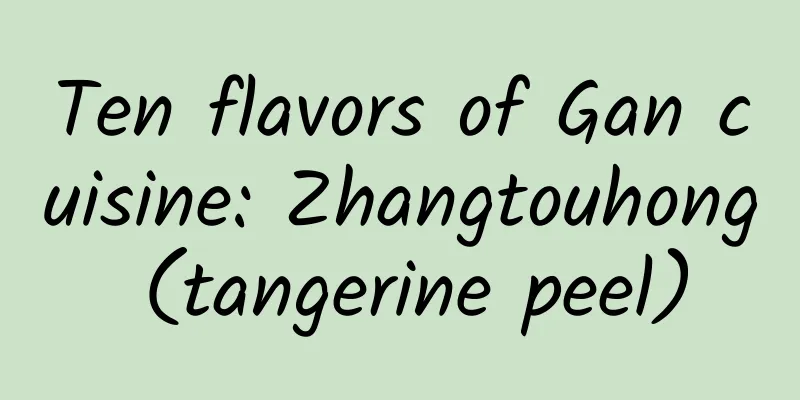Ten flavors of Gan cuisine: Zhangtouhong (tangerine peel)

|
In the hills of late autumn, golden tangerines bend the branches, and the air is filled with the sweet and sour aroma of fruit. Farmers in Jiangxi pick plump "Camphor Red" tangerines, peel them skillfully, and spread them on bamboo boards to dry in the sun - this seemingly ordinary work is a promise with time. It takes three years to peel and ten years to make a treasure. With the skillful hands and patience of Jiangxi people, a small piece of tangerine peel is transformed into "gold" that can be used as both medicine and food. The "red camphor" tangerine peel of the camphor tree has been famous since ancient times. The "Essentials of Materia Medica" of the Ming Dynasty called it "the older it is, the better it is", and it was listed as a royal tribute in the Qing Dynasty. The unique red soil and subtropical monsoon climate in central Jiangxi give birth to citrus fruits with dense oil chambers and rich aromatic substances. After being processed by the ancient method of "three steaming and three drying", the volatile oils and flavonoids in the tangerine peel have been precipitated over the years, and its medicinal value has doubled. The "Chinese Pharmacopoeia" records that tangerine peel can "regulate qi and strengthen the spleen, dry dampness and resolve phlegm", and modern research has found that its rich hesperidin can be antioxidant and aid digestion, and is even used in the auxiliary treatment of cardiovascular diseases. In Jiangxi, tangerine peel is not only a "versatile minister" in the drawer of the pharmacy, but also a "flavor magician" on the stove. When the Hakka people stew old duck soup, they must throw a few tangerine peels to remove greasiness and add fragrance; when the fishermen on the shores of Poyang Lake steam fish, they sprinkle a strand of tangerine peel powder to remove the fishy smell and enhance the freshness. In the herbal tea shop in midsummer, tangerine peel is boiled with black plum and hawthorn into a sour and sweet summer drink; in the porcelain cup in the cold winter, tangerine peel and red bean paste are dense and sweet, warming the body and the heart. There is even a saying that "one tael of tangerine peel is worth one tael of gold" among the people of Zhangshu. They regard tangerine peels over ten years old as heirlooms. When children have indigestion or the elderly have coughs and asthma, boiling water and taking a dose is a "folk remedy" passed down from generation to generation. From the allusion of "Oranges grown in the south of the Huai River become oranges" in "Yanzi's Mission to Chu", to the elegant taste of literati adding tangerine peel to tea and incense, citrus has long surpassed the boundaries of fruit. And Jiangxi people use time and wisdom to turn ordinary peels into the soul of flavor - a piece of tangerine peel contains the fragrance of the sun, the gift of water and soil, and condenses the philosophy of life that "the older, the more fragrant". It is not only a memory of Jiangxi on the tip of the tongue, but also a vivid footnote of "harmony between man and nature" in traditional Chinese medicine culture. |
<<: Is your child a "master of falling asleep in seconds"? Beware of "childhood narcolepsy"!
>>: Beware! Yelling, punching and kicking in your sleep may be a signal from your brain for help
Recommend
Is thin placenta a sign of malnutrition?
Important reminder: It is definitely abnormal for...
Is cervical cyst surgery painful?
What people often call cervical cysts actually re...
Just after drying the quilt, the person was sent to the hospital? This inconspicuous "little action" is so dangerous
The temperature has dropped sharply in the past f...
What is the reason for scanty menstruation, abdominal pain, and back pain?
Small menstrual flow, abdominal pain and back pai...
15-year-old girl's breast development picture
Girls in puberty have long been concerned about t...
What is the problem of fishy smell of leucorrhea
The leucorrhea has a fishy smell and is watery. T...
Anechoic breast nodules
Most people use ultrasound to check for foreign b...
Why do so many adults suffer from congenital heart disease? Is there a cure?
Author: Huang Lianjun, Chief Physician, Beijing A...
Is it normal for women to have dysmenorrhea every month?
Most adult women's menstruation is relatively...
Waist pain accompanied by lower abdominal pain
Gynecological diseases are always with women, and...
Squamous cell tumor of the cervix
Everyone is very familiar with cervical cancer, b...
Why do you feel tired during early pregnancy?
During pregnancy, the abdomen of a pregnant woman...
Why hasn't there been an AIDS vaccine yet?
Author: Sun Caijun (School of Public Health, Sun ...
What are the symptoms of miscarriage during pregnancy?
Fetal arrest is fetal growth retardation, which m...
What blood type attracts mosquitoes the most? What kind of people do mosquitoes like to bite?
Mosquitoes do not distinguish between people'...









